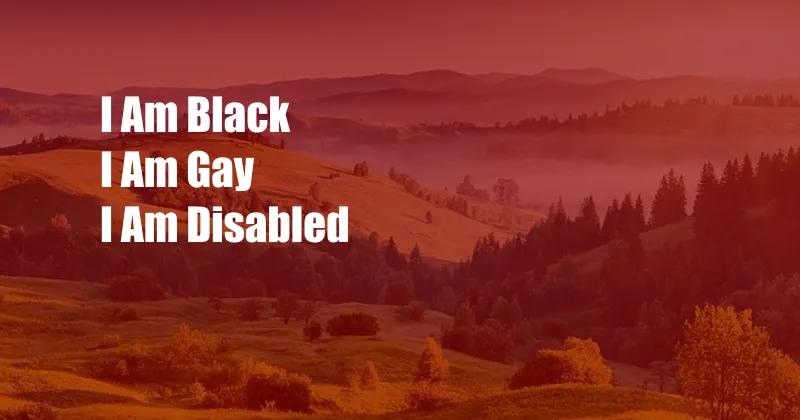
I Am Black, I Am Gay, I Am Disabled: Intersecting Identities and the Power of Self-Acceptance
In a world where intersectionality – the simultaneous experience of multiple forms of oppression or discrimination – is often overlooked, it is crucial to amplify the voices and experiences of those who exist at the crossroads of marginalized identities. I am black, I am gay, I am disabled – a phrase that embodies the intersectionality of race, sexual orientation, and disability – serves as a poignant reminder of the unique challenges and triumphs faced by individuals who belong to multiple marginalized groups.
Those who identify as black, gay, and disabled often navigate a complex landscape of societal biases, discrimination, and prejudice. They may face stereotypes that perpetuate negative perceptions about their race, sexual orientation, and disability. They may experience barriers to accessing healthcare, employment, and other essential services. Their lived experiences, often invisible to mainstream society, underscore the urgent need for greater visibility, inclusivity, and support.
Intersectionality: A Deeper Understanding
Intersectionality, coined by renowned scholar Kimberlé Crenshaw, is a theoretical framework that examines how different forms of discrimination overlap and interact, creating unique experiences of oppression for individuals who belong to multiple marginalized groups. It challenges the notion that these forms of discrimination operate independently of one another, instead recognizing the ways in which they compound and intersect.
For example, a black, gay, disabled person may face discrimination based on their race when seeking employment, discrimination based on their sexual orientation when accessing healthcare, and discrimination based on their disability when navigating public spaces. Understanding the intersectionality of their identities is essential for addressing the unique challenges they face and creating meaningful solutions.
Embracing Intersectional Pride
Despite the challenges they face, individuals who identify as black, gay, and disabled exhibit remarkable resilience and courage. They have carved out spaces for themselves in various fields, challenging stereotypes and inspiring others to embrace their authentic selves. By sharing their stories and experiences, they contribute to a growing movement of intersectional pride, where individuals celebrate the fullness of their identities and demand societal recognition and respect.
Intersectional pride is about acknowledging the unique strengths and contributions of individuals who exist at the intersections of marginalized identities. It is about recognizing the intersectionality of their experiences and demanding systemic changes that promote equity and inclusion for all.
The Importance of Allyship
Allyship plays a crucial role in supporting individuals with intersectional identities. Allies – individuals who do not share the same experiences of discrimination – can use their privilege to advocate for change, amplify marginalized voices, and challenge harmful stereotypes. They can educate themselves about intersectionality, support initiatives that promote inclusion, and create safe and welcoming spaces where everyone feels valued and respected.
In a world where intersectional identities are often overlooked, it is essential to foster allyship and build bridges of solidarity. By working together, we can create a more inclusive society where everyone has the opportunity to thrive and reach their full potential.
Tips for Creating an Inclusive and Equitable Environment
As we strive towards a more intersectionally inclusive society, there are several key actions we can take:
- Educate yourself about intersectionality: Understand the concept of intersectionality and its implications for individuals with marginalized identities.
- Practice empathy and understanding: Seek to understand the lived experiences of others, especially those who face multiple forms of discrimination.
- Challenge stereotypes and biases: Actively question and confront stereotypical assumptions about marginalized groups.
- Promote representation and visibility: Support organizations and initiatives that amplify the voices and experiences of individuals with intersectional identities.
- Be an ally: Use your privilege to advocate for change, support marginalized communities, and create a culture of inclusivity.
Frequently Asked Questions (FAQs)
- What is intersectionality?
Intersectionality is a theoretical framework that examines how different forms of discrimination overlap and interact, creating unique experiences of oppression for individuals who belong to multiple marginalized groups.
- Why is it important to understand intersectionality?
Understanding intersectionality helps us recognize the unique challenges faced by individuals with multiple marginalized identities and allows us to create meaningful solutions that address their specific needs.
- What is intersectional pride?
Intersectional pride is about acknowledging the unique strengths and contributions of individuals who exist at the intersections of marginalized identities and demanding societal recognition and respect.
- How can I be an ally?
To be an ally, educate yourself about intersectionality, practice empathy and understanding, challenge stereotypes and biases, promote representation and visibility, and use your privilege to advocate for change and create a culture of inclusivity.
Conclusion: Embracing Diversity and Inclusion
The experiences of those who identify as black, gay, and disabled remind us of the power of intersectional identities and the importance of embracing diversity and inclusion. By fostering a culture of empathy, understanding, and allyship, we can create a more equitable and just society where everyone has the opportunity to thrive and reach their full potential. I am black, I am gay, I am disabled – this statement is not just a declaration of identity but a powerful call for recognition, respect, and intersectional pride.
Are you interested in learning more about intersectionality and its implications for society? Share your thoughts and experiences in the comments section below. Together, we can continue the conversation and work towards creating a more inclusive and equitable world for all.